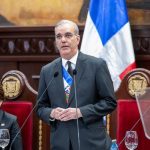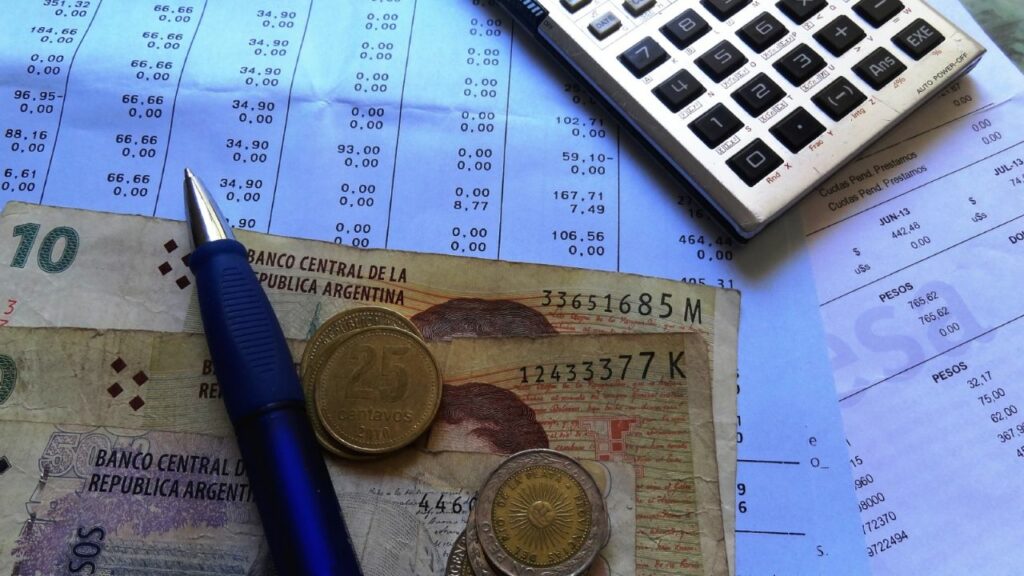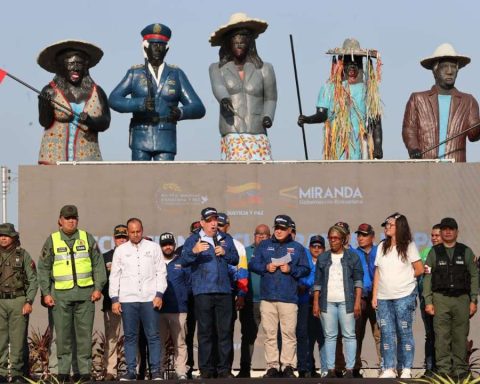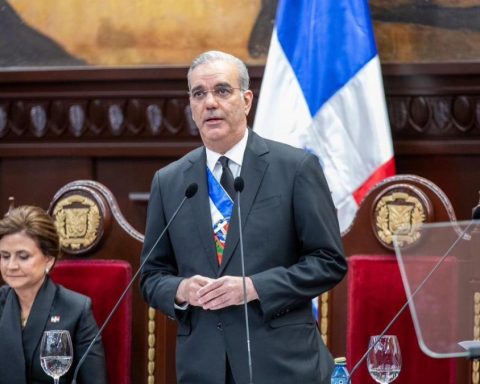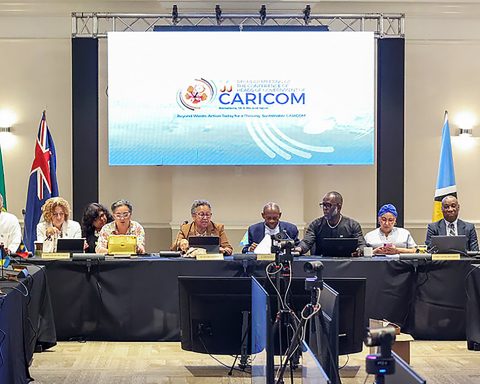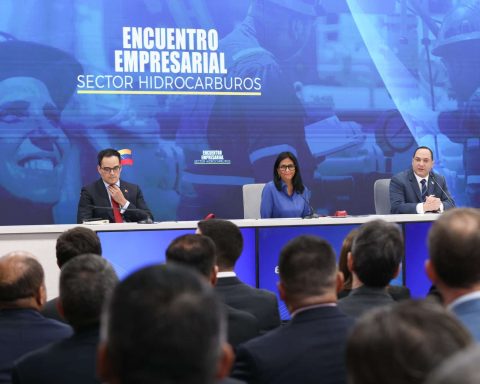“We are half bogged down, that’s why there were 48 hours of internal consultation,” warned one of the pro-government negotiators last Friday, as he left the headquarters of Congress in Santiago, where the ruling party and the opposition were once again negotiating to prepare a proposal for new constituent body, after the electoral debacle suffered by the option supported by the Executive. Today Monday – at 09:00 in the morning – the talks are restarted and, with them, the hopes of the Government to save a process that has one foot in the grave.
But this is not surprising, since it is the climate that has existed for almost three months and that seems to rotate on the same axis. For this reason, given the seriousness of the patient, Saturday and Sunday were given to the matches to carry out internal consultations, in order to have greater clarity and arrive with the necessary oxygen for today’s meeting.
Last Friday, December 2, had started with a lot of energy. President Gabriel Boric met early in La Moneda with the helmsmen of the parties that make up the government alliance. “Prepare to stay up all night,” said Paulina Vodanovic (PS), as she entered the Palace. This, because the objective of the appointment was to unite the ruling party so that, two hours later, they could arrive at the talks with the opposition. It was repeated over and over again that white smoke would come out that day. At the meeting, the President spoke specifically about the model that he had explored with the leader of the UDI, Javier Macaya, on Wednesday, November 30, in a brief conversation.
This CIt consisted of a group of experts drafting a constitutional draft, which would then be delivered to a 100% elected body. That instance –with the experts who could function as advisors– would prepare a proposal for a new Constitution, which Congress would later have to ratify by 4/7. Finally, if he got enough support, he could go through an exit plebiscite.
One point that the Head of State made clear is that, in this process, Parliament could not change the text of the constitutional proposal. And – according to those who attended the meeting – he placed special emphasis on the need to complete the process.
However, when they were inside, a proposal for a mechanism prepared by Chile Vamos was disseminated, which, in addition to proposing the ratification by 4/7 by Congress of the new text proposal, included a mixed body: 50 experts appointed from the forces of Congress and 50 elected people.
When leaving, the leaders explained – in reserve – that for some sectors of the government alliance it was difficult to support a ratification by Congress. “The Communist Party was not at the press point,” some emphasized as they left. And indeed, the two representatives of the PC at the meeting – Senator Claudia Pascual and Lautaro Carmona, general secretary of the community – were not at the conference after the meeting, nor did they walk along Morandé street with the other leaders in the direction of the former Congress. .
And it is that the ratification of Parliament is not a point with which I Approve Dignity feels comfortable, however, some leaders explained that they preferred that to a mixed body. “It is not desirable, but it is the scenario we have,” they specified on Friday.
A day earlier, the communist deputy Karol Cariola tweeted that “the democratic conviction of the right is half: they feel more comfortable with appointments than with elections. It is unfortunate that they seek to go back to a supervised process.
Thus, in this context, the President planted his red line: that it be a 100% elected body. It was not a surprise, since in the Government Palace he had stated that, in order to safeguard legitimacy in the future, it should be “an elected body that drafts it”, with “all the collaboration of experts that are established”.
Already in the middle of his state visit to Mexico, the President had shared a similar idea. However, it was a strong signal, given the role of dispensation that the Executive fulfilled from the beginning of the talks, when a disagreement arose with the right and the spokesperson minister, Camila Vallejo, was accused of intervening in the process with her words. , which then even caused the opposition to ask to postpone a meeting.
Despite this, the statements of the leaders of the ruling party played against this new push by the President. Some had already opened up to a mixed body, that is, where the experts appointed by Congress had not only a voice but also a vote. Juan Ignacio Latorre, leader of the Democratic Revolution (DR), assured in mid-November that “we are fully prepared to make it more flexible and give in, even to introduce mixed modalities with experts and elected officials”, and Paulina Vodanovic pointed out that the PS did not reject the mixed organ.
With ten minutes remaining before 10 in the morning, the time when the negotiators of the ruling party and the opposition were summoned to continue discussing a new constituent body, the Minister of the General Secretariat of the Presidency, Ana Lya Uriarte (PS ). Once at the meeting between the ruling party and the opposition, they say that during her turn the minister defended the President’s position: the importance of a 100% elected body.
The slam of the right to the Macaya proposal
“I’m going to be super honest. When you transmit things without having a prior conversation with your coalition or the different people, that obviously causes the willingness to dialogue to fade away,” he said. the president of the UDI and senator, Javier Macaya, leaving the meetings that were held on Friday. The same as when he arrived, at almost 11 in the morning, he climbed the stairs to reach the third floor of the building without answering questions from the media.
The phrase he said at the end of the day was understood as a gesture of mea culpa towards his sector, for having explored a mechanism – a body with 100% elected people, with a draft and the need for ratification of the text by Congress – that did not find support among the bases of the right.
The entry of the leader of the National Renewal (RN), also a senator Francisco Chahuán, contrasted with that of Macaya. Chahuán quickly went to answer the questions of the journalists who were stationed in the former Congress. “There is no room for a 100% elected body. Our benches opt for one with 50 experts and 50 elected. We are going to keep the word of a new Constitution, but to advance it is necessary to have the votes in Congress”, which seemed like a response to the UDI helmsman.
Before 1:00 p.m., Macaya asked for time to unify positions within the right. The dynamic was to set interruptions to the common dialogue and separate into three different rooms to talk about the negotiations between members of the same axis. Chile Vamos was left in one; in another, the government alliance; and in a third, Democrats and Yellows.
According to those present, in one of the general meetings Macaya confessed that the mechanism explored with President Gabriel Boric would fail in his bloc.
The formulas that were studied during the day
Although the main issue is the role of the experts – the same one that has existed since the start of the talks in September, almost three months after the first post-plebiscite meeting – during the day different formulas were tested, none officially. One is the well-known one, a constitutional draft drafted by experts, a 100% elected body and a necessary ratification of the proposal by Congress to go to a plebiscite.
The second, less widespread, had to do with opening up to a mixed body –experts appointed by Congress with the right to vote–, if the idea of the constitutional draft was eliminated.
As Francisco Chahuán explained, the right did not want to cede to a 100% elected body, “to avoid any refounding exercise or alleged blank sheets”, while the left indicated that the product of a body that had members with the right to vote and that have not been elected by the citizens, would lack legitimacy in the future.
The President against time
The President’s outlook is not easy and he is against time. He has already suffered a severe blow with the rejection in the Senate of the option that the Government proposed for the new National Prosecutor, José Morales, specifically because there were even members of the ruling party who abstained or voted against. Added to this is the change, in March 2023, of the Senate board of directors currently chaired by the socialist Álvaro Elizalde, by the UDI Juan Antonio Coloma. All of this, added to the fact that a possible election for conventional voters is being postponed more and more each day from the original plan that was in April –since the Servel indicated that it needed 150 days, five months prior to the vote to draw up the electoral roll– and the fear that that vote is combined with the municipal and regional ones set for October 2024 or with the result of the discussion of a new withdrawal of pension funds (whose date to be discussed expires in April).
According to Marco Moreno, an academic from the U. Central with a Master’s in Political Science, the President once again put his political capital in the direction of a new Constitution, this time to unlock an agreement today “bogged down, which has been losing attraction in the citizenship”.
The main reason, explains Moreno, is to clear up the constituent issue to channel energy towards “the two important reforms that are currently being discussed in Congress: the tax reform and the reform of the pension system.”
The best scenario for the Government, indicates the academic from the U. Central, is that the constituent issue is resolved quickly and that the political parties reach an agreement in December, and this can materialize in the election of conventional, “hopefully between March and September 2023”.
On the contrary, the worst scenario “would be the impossibility of reaching an agreement, that this be delayed beyond the summer, and we have a campaign to elect the conventional futures with winter upon us and the possibility that parliamentarians can replace a new withdrawal to the pension funds, which could generate a very complex effect for the government project and for the processing of its reforms”.
According to Mauricio Morales, an academic from the University of Talca and a doctor in Political Science, if Boric got involved in this discussion it is because he has enough information to guarantee that this agreement is finally signed. “Otherwise, he would have made a tremendous mistake, since he would be the protagonist of a new failure on a highly sensitive issue for his government coalition. The President has already lived through the experience of the plebiscite on September 4. Instead of playing an absolutely neutral role, he and his cabinet openly favored the Approval option, which was beaten in those elections, ”he emphasizes.
He adds that “the fact of practically announcing a constitutional agreement was extremely risky. But if that deal comes to fruition, then the President will be able to strengthen his leadership.”
And he points out that, if the agreement stipulates a Mixed Convention and not a 100% elected Constitutional Convention, which is what the Head of State requested, “the celebration would be halfway, because, although an agreement was reached, that agreement would be in the antipodes of the preferences of the President and his coalition regarding the conformation of the body in charge of writing the new Constitution”.
In any case, and in the meantime, the process is in the ICU, waiting for the actors to save it against the clock.








